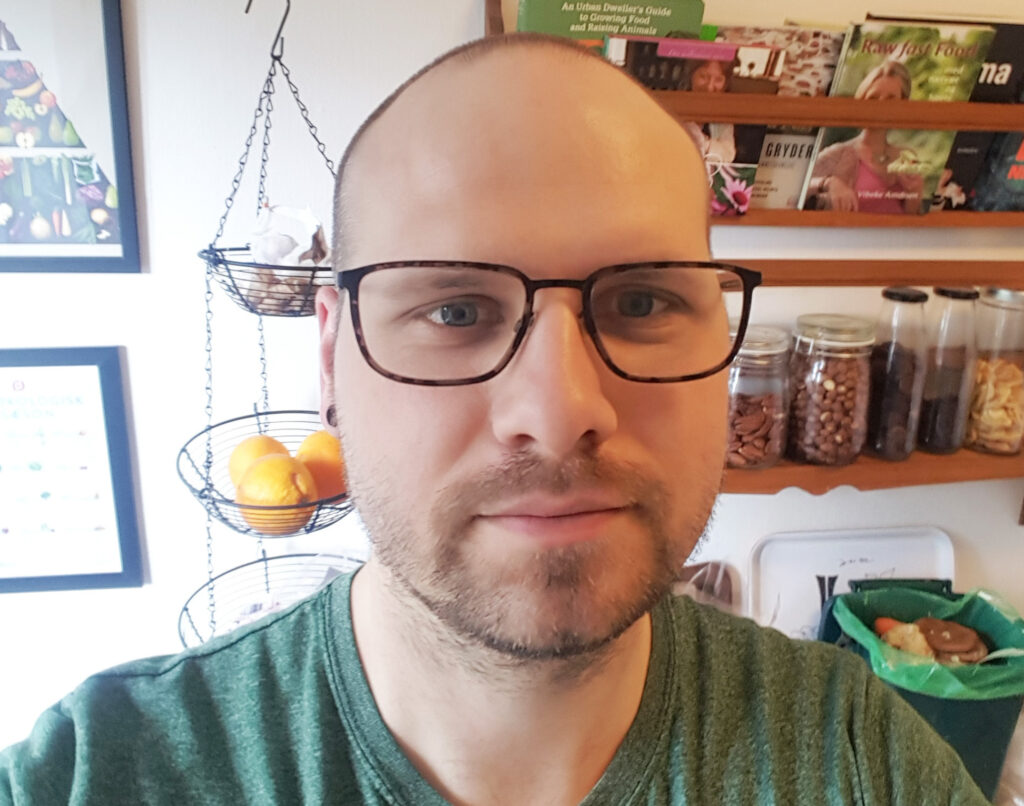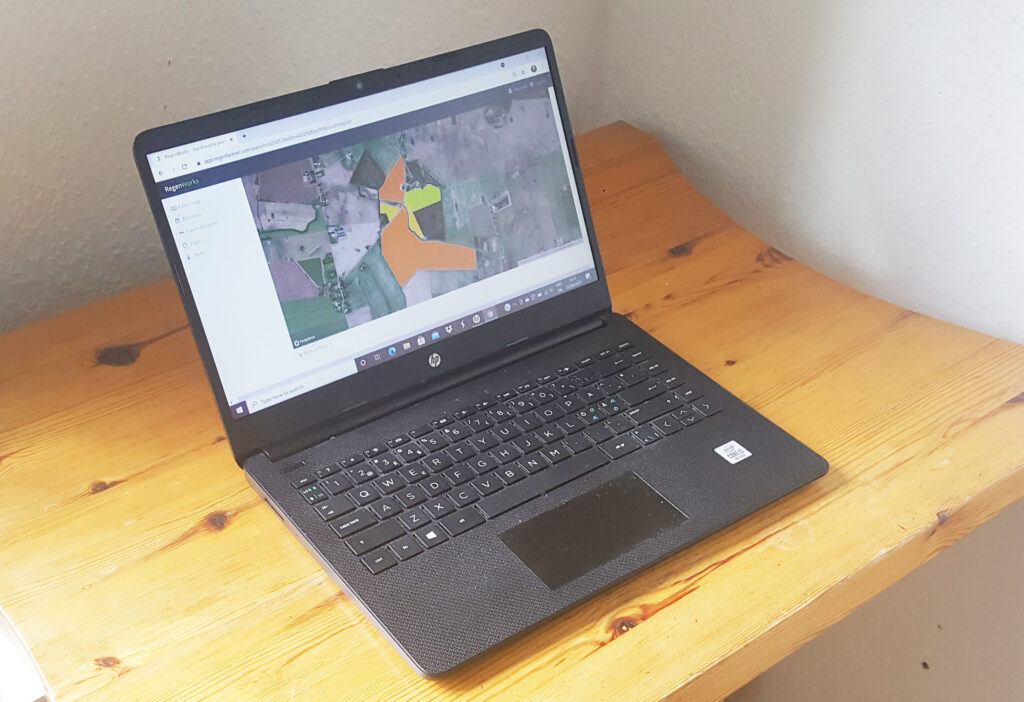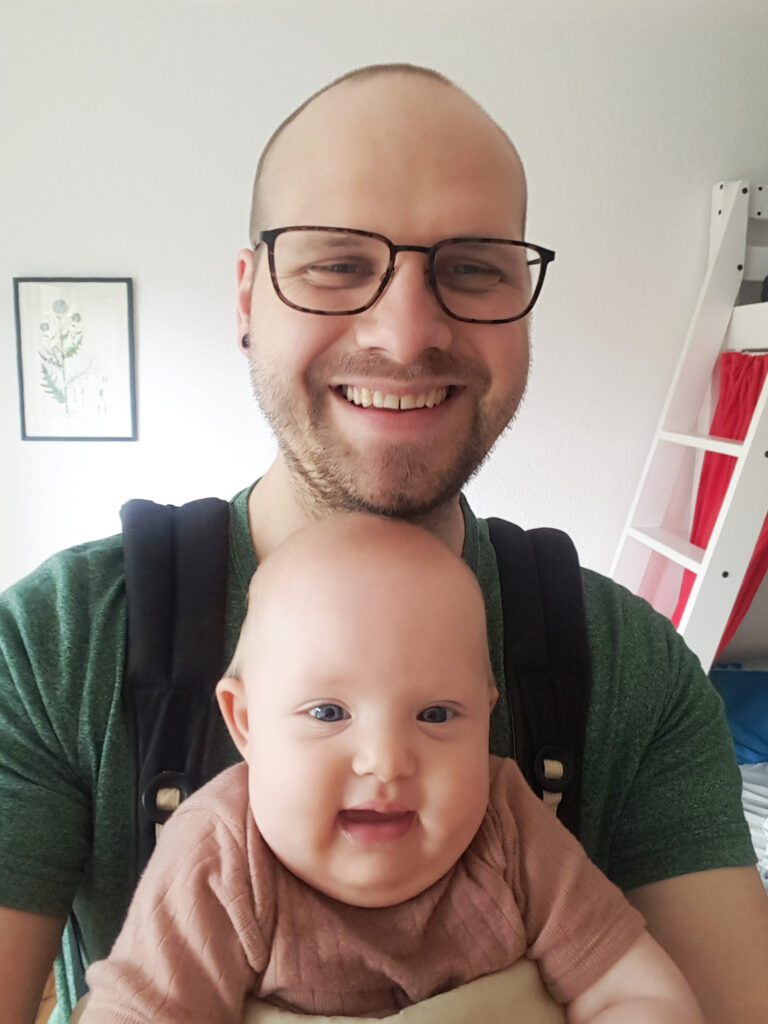”I’ve consciously put myself in this situation. In many ways, it’s about growing up for me. It’s about asking myself what defines success and what matters. It’s about being true to yourself.”

This article is part of a series of ‘Chat with a FoTer’ where we sit down with Founders of Tomorrow (FoT) alumni to discuss the amazing things they do. In addition to being a FoT/Danske iDeer alumnus, Kristoffer will be speaking at the upcoming Founders of Tomorrow 2021 ‘Regenerative visions – beyond sustainability’.
Kristoffer is CEO of Regen Farmer, a software company that he founded in 2018. Regen Farmer provides farmers and agricultural advisors with the services and tools needed to implement and manage regenerative agriculture and agroforestry. At the time of the interview, Kristoffer is sitting in his kitchen with his daughter playing in the background.
Hey Kristoffer! How are you doing?
I’m well, thanks! Since the last time we talked, we’ve moved ahead with some exciting partnerships. I’ve been focusing on how we can leverage our digital solutions to build an ecosystem around the farmers and agricultural advisors who adopt new ways of managing their farm and might not find support in the current ecosystem. I’ve been exploring how we can reimagine a whole new ecosystem and who the change agents would be in this transition.
Sounds really interesting! Before we jump into your story, could you say a few words on what regenerative agroforestry is?
Well, agroforestry is a land use management system in which trees or shrubs are grown around or among crops or pastureland. The output can be food, fibre, biomass or timber. And by regenerative in the context of agroforestry, I refer to a paradigm where land stewards regenerate the soil, improve water cycles, increase biodiversity, enhance ecosystem services and sequester carbon. It can be seen as an ongoing journey towards a state that is more aligned with both nature and human culture.
Sounds great. What are some of the main barriers hindering farmers from transitioning into agroforestry?
What I’ve learnt is that an innovative entrepreneurial mindset is key. And this has to do with risk. If we can reduce the risk for farmers and create an experimental environment for solutions, more will be open to innovate. In my experience, farmers know where to innovate as they are the experts. I believe that by reducing the risks coupled with planning tools and financial models, we can give rise to something truly transformative.
What is your ‘regenerative vision’ that you work towards?
My regenerative vision focuses on Denmark and land use. The thing is, we don’t have a sustainable solution for land use here. If we in Denmark cannot figure out how to manage our land within planetary boundaries, then how can we advocate for solutions for others? We should not try to optimise something that is a dead-end (like the current system). And in this vision, human prosperity is aligned with planetary prosperity.
Sounds amazing. But how on Earth did an engineer and a serial tech entrepreneur end up working with regenerative agroforestry?
Well, it’s been a long journey. I first worked as a playground equipment designer, after which I moved to Copenhagen to do my master’s in Design and Innovation at the Technical University of Denmark (DTU). At DTU, I started a start-up, an e-commerce website. After a year, I decided to close it as I wanted to work more with product development and design. That’s when I started a jewellery company using 3D printing. I was really passionate about the aesthetics of it, and it was one of the first things I professionally was proud of.
At that time, I was already drawn towards the idea of decentralised production. This led to questions about the environmental footprint of the production. Although with 3D printing, we could save materials, I wanted to do something more sustainable. I started looking into clothing and wanted to enter that sector. I started working with the vision and branding of a new company. I had big ambitions for the sustainability of it. I worked for a year trying to do something good enough but found out that at that point it was almost impossible. I could see that there was a bottle neck in scaling the regenerative supply of materials. It was just not there yet. The production of fibres and fabrics in the fashion industry was still very conservative.
So, I realised that I needed to go and work on scaling regenerative supply. I turned to agriculture with the question of what the systems are that should be scaled.
About 2,5 years ago, regenerative agriculture was becoming more and more mainstream. The Sustainable Development Goals and the Project Drawdown had a big influence in the direction I took as well. It all sort of just converged into scaling regenerative land-use.

How was it entering the regenerative agriculture field as an engineer?
I had to learn to understand living systems. In the hard-core engineer mindset, you want systems in which you know what’s happening and you can manage everything. In natural systems, this is not possible as the complexity of connections are impossible to keep track of. There is a big difference between the mechanistic view and the organic way of looking at things. This affects everything from how you build and lead an organisation to how you approach a problem. And it impacts the solutions you make. It perhaps came easier for me as I was used to changing mindsets having previously worked within other fields.
Wow, I recognise that – and would say that the mechanistic way of thinking is not only limited to engineers. How has this shaped the way you see the role of technology in the green transition?
There are a lot of technological solutions out there. For example, in the land use sector, we have satellite monitoring and a bunch of other technologies available. I’d say that the problem is not the lack of technologies but how things are managed. Technology can definitely help to facilitate the transition, but the transition is not about having more technology.
In my opinion, there is an overrepresentation of engineers in the current start-up ecosystem and too little eco-literacy. I think it also has to do with how the start-up ecosystem is structured. One example is that you can’t patent ecological function, so it’s really hard to sell it to a typical investor. So, if you want to go the typical start-up route, you need to wrap it in technology somehow. Robots, vertical farming, GMO, or something else that an investor wants. But that’s not necessarily the best overall solution for society or the planet, but it’s the solution that the ecosystem favors.
How are you guided by regenerative principles as an entrepreneur?
At the time I joined Danske iDeer in 2017, I was running the 3D printing jewellery company I mentioned before. I was looking for something different. I gained a lot of perspective and knowledge about technology, exponentials and tech start-ups. But I also started asking myself what would happen if I went into the regular Silicon Valley-style start-up journey with VC funding and all.
At this point, I also came across the Zebras Unite movement. They are asking questions, such as how the solutions are governed and how the power is concentrated in the ecosystem. It made me think even more about how to create a company that would not grow into what I’m trying to disrupt.
And that’s the journey I’m on. It’s not that easy. At this point, I need the control to ensure that everything is going in the right direction and that the long-term governance of Regen Farmer is aligned with planetary and human prosperity.
Humility is important here. I could try to go and get funding and scale up quickly. But doing that would give a specific direction to what I’m building. Each day that I wake up, I have the possibility to look at what I build and make sure that I’m building it for the long-term. It’s a balancing act. Of course, you need short-term targets, but my focus is on the long-term impact.
I can see that the solutions that come out of this approach are quite different from those that would come out if I were to get VC funding. By doing things differently and at a natural pace, the output is truly different. Especially since the problems I work with are so complex. You won’t get it right in the first, second or even the third try. I’ve been through four or five pivots already. I’m not saying the typical way to fund a start-up is wrong, I just think that the type of companies that are born that way are quite different.
I want to build a company in which people can be thriving human beings. For this, a natural tempo is important. And the fact that we are taking care of our two kids at home instead of putting them in daycare also sets natural limits to my time.

That’s definitely a different type of an approach than what we are used to hearing about. Do you think you could’ve done it with your first company already?
Hmm, I’m not sure. As I’ve learnt so much over the years. Somehow having started a few companies before Regen Farmer has given me the experience that I needed to have both strong impact goals and a regenerative approach to company culture and structure. Also, the passive income I receive from the jewellery company gives me financial room to work with.
It’s been important to see others building and doing something similar. That’s been the biggest inspiration for me.
When I talk to founders who have broken their necks in trying to fund and scale their companies and are weighted heavily by how the structure of the financial models around their businesses constrain them, I feel I’m on the right path.
I’ve consciously put myself in this situation. In many ways, it’s about growing up for me. It’s about asking myself what defines success and what matters. It’s about being true to yourself, not living someone else’s version of start-up success. I’ve come to realise that chasing recognition doesn’t make me happy. I’m still on that journey but I feel quite confident with how I live my life and with what I build.
We in the Nordics have a unique position for creating thriving long-term businesses. I believe that many companies will die out if they are not aligned with the regenerative future. It’s the only way we as humans can live on this planet. It’s our only choice.
Thank you Kristoffer! We look forward to seeing you and hearing more about your journey at Founders of Tomorrow!
